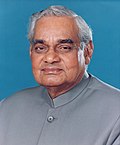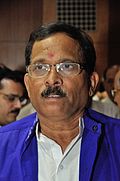Portrait Minister(Birth-Death) Term of office Political party Ministry Prime Minister From To Period Minister of Works, Mines and Power Narhar Vishnu Gadgil (1896–1966)Bombay 15 August 1947 26 December 1950 3 years, 133 days Indian National Congress Nehru I Jawaharlal Nehru Minister of Natural Resources and Scientific Research Sri Prakasa (1890–1971) 26 December 1950 13 May 1952 1 year, 139 days Indian National Congress Nehru I Jawaharlal Nehru Maulana Abul Kalam Azad (1888–1958)Rampur 13 May 1952 6 June 1952 24 days Nehru II Minister of Irrigation and Power Gulzarilal Nanda (1898–1998)Sabarkantha 6 June 1952 17 April 1957 4 years, 315 days Indian National Congress Nehru II Jawaharlal Nehru S. K. Patil (1898–1981)Mumbai South 17 April 1957 2 April 1958 350 days Nehru III Hafiz Mohamad Ibrahim (1889–1968)Uttar Pradesh 2 April 1958 10 April 1962 5 years, 85 days 10 April 1962 26 June 1963 Nehru IV O. V. Alagesan (1911–1992)Chengalpattu 26 June 1963 19 July 1963 23 days Kanuri Lakshmana Rao (1902–1986)Vijayawada 19 July 1963 27 May 1964 326 days 27 May 1964 9 June 1964 Nanda I Gulzarilal Nanda H. C. Dasappa (1894–1964) 9 June 1964 19 July 1964 40 days Shastri Lal Bahadur Shastri Kanuri Lakshmana Rao (1902–1986)Vijayawada 19 July 1964 11 January 1966 1 year, 189 days 11 January 1966 24 January 1966 Nanda II Gulzarilal Nanda Fakhruddin Ali Ahmed (1905–1977)Barpeta 24 January 1966 13 November 1966 293 days Indira I Indira Gandhi Kanuri Lakshmana Rao (1902–1986)Vijayawada 13 November 1966 13 March 1967 6 years, 361 days 13 March 1967 18 March 1971 Indira II 18 March 1971 9 November 1973 Indian National Congress (R) Indira II K. C. Pant (1931–2012)Nainital 9 November 1973 10 October 1974 335 days Minister of Energy K. C. Pant (1931–2012)Nainital 10 October 1974 24 March 1977 335 days Indian National Congress (R) Indira II Indira Gandhi P. Ramachandran (1921–2001)Chennai Central 26 March 1977 28 July 1979 2 years, 124 days Janata Party Desai Morarji Desai K. C. Pant (1931–2012)Uttar Pradesh 30 July 1979 14 January 1980 168 days Indian National Congress (Urs) Charan Charan Singh A. B. A. Ghani Khan Choudhury (1927–2006)Malda 14 January 1980 2 September 1982 2 years, 231 days Indian National Congress Indira IV Indira Gandhi P. Shiv Shankar (1929–2017)Secunderabad 2 September 1982 31 October 1984 2 years, 120 days 31 October 1984 31 December 1984 Rajiv I Rajiv Gandhi Vasant Sathe (1925–2011)Wardha 31 December 1984 3 September 1988 3 years, 247 days Rajiv II Makhan Lal Fotedar (1932–2017)Uttar Pradesh 3 September 1988 19 September 1988 16 days Vasant Sathe (1925–2011)Wardha 19 September 1988 2 December 1989 1 year, 74 days Arif Mohammad Khan (born 1951)Bahraich 6 December 1989 10 November 1990 339 days Janata Dal Vishwanath V. P. Singh Kalyan Singh Kalvi (born 1933)Barmer 21 November 1990 21 June 1991 212 days Samajwadi Janata Party (Rashtriya) Chandra Shekhar Chandra Shekhar Minister of Power Kalpnath Rai (1941–1999)Ghosi 21 June 1991 18 January 1993 1 year, 211 days Indian National Congress (I) Rao P. V. Narasimha Rao N. K. P. Salve (1921–2012)Maharashtra 18 January 1993 16 May 1996 3 years, 119 days Atal Bihari Vajpayee (1924–2018)Lucknow 16 May 1996 1 June 1996 16 days Bharatiya Janata Party Vajpayee I Atal Bihari Vajpayee H. D. Deve Gowda (born 1933)Karnataka 1 June 1996 21 April 1997 324 days Janata Dal Deve Gowda H. D. Deve Gowda Inder Kumar Gujral (1919–2012)Bihar 21 April 1997 9 June 1997 49 days Gujral Inder Kumar Gujral Yoginder K Alagh (1939–2022)Gujarat 9 June 1997 19 March 1998 283 days Rangarajan Kumaramangalam (1952–2000)Tiruchirappalli 19 March 1998 13 October 1999 2 years, 157 days Bharatiya Janata Party Vajpayee II Atal Bihari Vajpayee 13 October 1999 23 August 2000 [†] Vajpayee III Atal Bihari Vajpayee (1924–2018)Lucknow 23 August 2000 30 September 2000 38 days Suresh Prabhu (born 1953)Rajapur 30 September 2000 24 August 2002 1 year, 328 days Shiv Sena Atal Bihari Vajpayee (1924–2018)Lucknow 24 August 2002 26 August 2002 2 days Bharatiya Janata Party Anant Geete (born 1951)Ratnagiri 26 August 2002 22 May 2004 1 year, 270 days Shiv Sena P. M. Sayeed (1941–2005)NCT of Delhi 23 May 2004 18 December 2005 [†] 1 year, 209 days Indian National Congress Manmohan I Manmohan Singh Manmohan Singh (born 1932)Assam 18 November 2005 29 January 2006 72 days Sushilkumar Shinde (born 1941)Maharashtra , until 2009Solapur , from 2009 29 January 2006 22 May 2009 3 years, 113 days 28 May 2009 31 July 2012 3 years, 64 days Manmohan II Veerappa Moily (born 1940)Chikballapur 31 July 2012 28 October 2012 89 days Jyotiraditya Scindia (born 1971)Guna 28 October 2012 26 May 2014 1 year, 210 days Piyush Goyal (born 1964)Maharashtra 27 May 2014 3 September 2017 3 years, 99 days Bharatiya Janata Party Modi I Narendra Modi Raj Kumar Singh (born 1952)Arrah 3 September 2017 30 May 2017 6 years, 280 days 31 May 2019 9 June 2024 Modi II Manohar Lal Khattar (born 1964)Karnal 10 June 2024 Incumbent 1 year, 206 days Modi III 













































